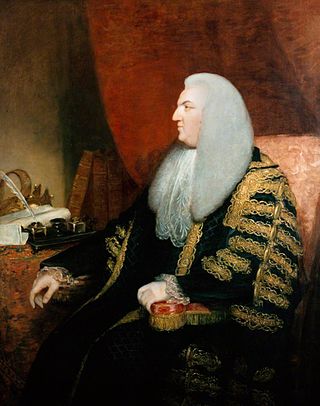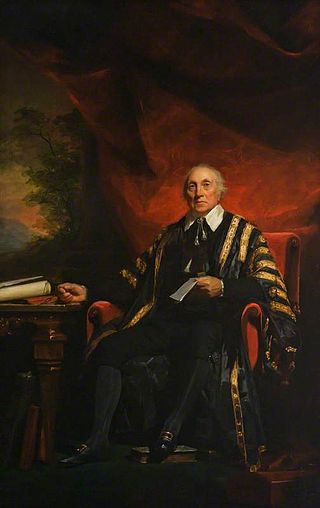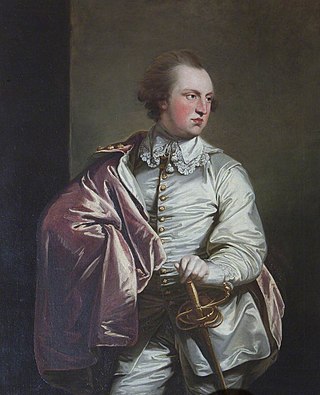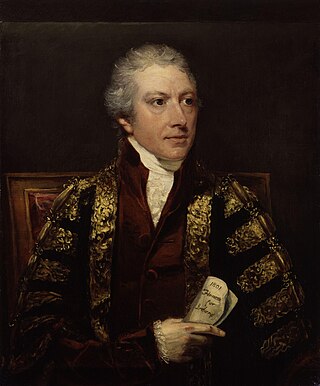
Charles Manners-Sutton, 1st Viscount Canterbury, was a British Tory politician who served as Speaker of the House of Commons from 1817 to 1835.

Baron Brownlow, of Belton in the County of Lincoln, is a title in the Peerage of Great Britain. It was created in 1776 for Sir Brownlow Cust, 4th Baronet. The Cust family descends from Richard Cust (1622–1700) of The Black Friars, Stamford, who represented Lincolnshire and Stamford in Parliament. In 1677 he was created a baronet, "of Stamford in the County of Lincoln". He was succeeded by his grandson Richard Cust, 2nd Baronet, who married Anne Brownlow, daughter of Sir William Brownlow, 4th Baronet, "of Humby", Lincolnshire, and sister and sole heiress of John Brownlow, 1st Viscount Tyrconnel, 5th Baronet of Belton House, Lincolnshire. The 2nd Baronet's son Sir John Cust, 3rd Baronet, sat as a Member of Parliament for Grantham and served as Speaker of the House of Commons from 1761 to 1770 and in 1754 inherited the Brownlow estates, including Belton, on the death of his childless maternal uncle Viscount Tyrconnel. His son Brownlow Cust, 4th Baronet, represented Ilchester, Somerset, and Grantham in Parliament and in 1776 was raised to the peerage as Baron Brownlow, "of Belton in the County of Lincoln", chiefly in recognition of his father's services. He was succeeded by his son John Cust, 2nd Baron Brownlow, who had sat as a Member of Parliament for Clitheroe, Lancashire, and also served as Lord Lieutenant of Lincolnshire for many years. In 1815 he was created Viscount Alford, "in the County of Lincoln", and Earl Brownlow, both in the Peerage of the United Kingdom. In 1810 the future 1st Earl had married Sophia Hume, a daughter of Sir Abraham Hume, 2nd Baronet, of Wormleybury, by his wife Lady Amelia Egerton, a great-granddaughter of John Egerton, 3rd Earl of Bridgewater.

John Dunning, 1st Baron Ashburton, of Spitchwick the parish of Widecombe-in-the-Moor, Devon, was an English lawyer and politician, born in Ashburton in Devon, who served as Solicitor-General from 1768. He was first noticed in English politics when he wrote a notice in 1762 defending the British East India Company merchants against their Dutch rivals. He was a member of parliament from 1768 onward. His career in the House of Commons is best known for his motion in 1780 that "the influence of the crown has increased, is increasing, and ought to be diminished". He was created Baron Ashburton in 1782.

Fletcher Norton, 1st Baron Grantley, PC was an English lawyer and politician who sat in the House of Commons from 1756 to 1782 when he was raised to the peerage as Baron Grantley.

Tamworth is a constituency represented in the House of Commons of the UK Parliament, based on the town of Tamworth in Staffordshire, England. The seat is currently represented by Sarah Edwards of the Labour Party, re-elected in the UK 2024 general election.

Lord Frederick Campbell was a Scottish nobleman and politician. He was Lord Clerk Register of Scotland, 1768–1816; Member of Parliament (MP) for Glasgow Burghs (1761–1780) and for Argyllshire (1780–1799).

Charles Wolfran Cornwall was a British politician who sat in the House of Commons from 1768 to 1789. He was Speaker of the House of Commons from 1780 to 1789.
Cambridge University was a university constituency electing two members to the British House of Commons, from 1603 to 1950.
Helston, sometimes known as Helleston, was a parliamentary borough centred on the small town of Helston in Cornwall.
The 1768 British general election returned members to serve in the House of Commons of the 13th Parliament of Great Britain to be held, after the merger of the Parliament of England and the Parliament of Scotland in 1707.

Brownlow Cust, 1st Baron Brownlow, of Belton House near Grantham in Lincolnshire, was a British Tory Member of Parliament.

Sir John Cust, 3rd Baronet PC, of Belton House near Grantham in Lincolnshire, was a British politician who served as Speaker of the House of Commons from 1761 to 1770.
Norfolk was a County constituency of the House of Commons of the Parliament of England from 1290 to 1707, then of the Parliament of Great Britain from 1707 to 1800 and of the Parliament of the United Kingdom from 1801 to 1832. It was represented by two Members of Parliament. In 1832 the county was divided for parliamentary purposes into two new two member divisions – East Norfolk and West Norfolk.

Peregrine Bertie was an English politician, the second son of Montagu Bertie, 2nd Earl of Lindsey. A member of the court party, later the Tories, he sat for Stamford from 1665 to 1679, and from 1685 to 1687. Most active in Parliament during the 1670s, he and other members of his family were consistent political supporters of Bertie's brother-in-law, the Duke of Leeds throughout several reigns. While he never achieved significant political stature, he did hold several minor government offices: he was a captain in the Royal Regiment of Horse Guards until 1679, and a commissioner of the Alienation Office and a customs officer. The death of his wife's brother brought the couple an estate in Waldershare, Kent, where Bertie ultimately settled. He sat for Westbury after the Glorious Revolution, but showed little political activity compared to others of his family. Bertie stood down from Parliament in 1695 and died in 1701, leaving two daughters.
Richard William Brinsley Norton, 8th Baron Grantley, is a retired banker and politician. In early life he worked for the Conservative Party, but joined the UK Independence Party (UKIP) when it was founded in 1993. As a hereditary peer, he was a member of the House of Lords from 1995 to 1999.
The 1780 election of the Speaker of the House of Commons occurred on 31 October 1780.

The 1802 election of the Speaker of the House of Commons occurred on 10 February 1802.

The 1817 election of the Speaker of the House of Commons occurred on 2 June 1817.

The 1835 election of the Speaker of the House of Commons occurred on 19 February 1835.













